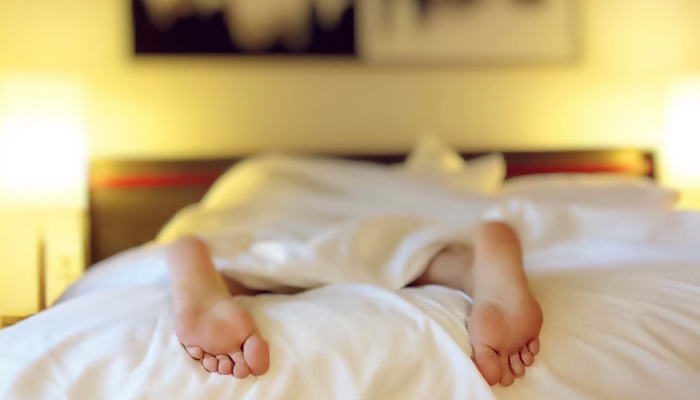A good night’s sleep is crucial for optimal health, yet so many of us struggle to get the rest we need. If you’re tired of tossing and turning, fear not! We’ve compiled a list of 10 scientifically-backed sleep hacks to help you fall asleep quickly and wake up feeling rejuvenated. From choosing the perfect mattress for your needs to establishing a bedtime routine, these tips will have you snoozing like a baby in no time. So, let’s dive into the world of sleep optimization and uncover the secrets to a better night’s rest!
10 – Find the Perfect Mattress for Your Needs
The foundation of a good night’s sleep is a comfortable and supportive mattress. Research shows that sleeping on the right mattress can significantly improve sleep quality and reduce back pain. Consider factors such as firmness, materials, and size when selecting the ideal mattress for your needs. Don’t forget to replace your mattress every 7-10 years, as its support and comfort can degrade over time.
09 – Upgrade Your Pillow
Just like your mattress, the right pillow can make a world of difference when it comes to sleep quality. Choose a pillow that supports your head and neck, keeping your spine aligned. Memory foam and latex pillows are popular choices due to their contouring and support properties. Remember to replace your pillow every 1-2 years to maintain optimal comfort and hygiene.
08 – Create a Sleep-Inducing Environment
A serene and calming environment is essential for promoting restful sleep. Keep your bedroom cool (around 60-67°F or 15-19°C), dark, and quiet. Invest in blackout curtains and a white noise machine if needed. Adding a few drops of lavender essential oil to your pillow or using a diffuser can also help create a soothing atmosphere.
07 – Establish a Consistent Sleep Routine
Going to bed and waking up at the same time every day (even on weekends) helps regulate your body’s internal clock, making it easier to fall asleep and wake up naturally. Establish a bedtime routine that signals to your body that it’s time to wind down, such as taking a warm bath, reading a book, or practicing relaxation techniques.
06 – Limit Exposure to Screens Before Bed
Exposure to the blue light emitted by screens can suppress melatonin production, making it harder to fall asleep. Aim to disconnect from electronic devices at least an hour before bedtime. If you must use screens, consider using blue light-blocking glasses or apps that filter blue light.

05 – Try the 4-7-8 Breathing Technique
This relaxation technique, developed by Dr. Andrew Weil, is a natural tranquilizer for the nervous system. To practice, inhale quietly through your nose for 4 seconds, hold your breath for 7 seconds, and exhale through your mouth for 8 seconds. Repeat this cycle four times to help calm your mind and prepare your body for sleep.
04 – Keep a Sleep Diary
Tracking your sleep patterns and habits can help you identify potential issues and make necessary adjustments. Note the time you go to bed, wake up, total sleep time, and any factors that may have disrupted your sleep. Reviewing this information can help you spot trends and develop a personalized sleep improvement plan.
03 – Exercise Regularly
Regular physical activity has been proven to improve sleep quality and reduce the time it takes to fall asleep. Aim for at least 150 minutes of moderate-intensity exercise or 75 minutes of vigorous-intensity exercise per week. However, avoid exercising too close to bedtime, as it may be too stimulating and make it harder to fall asleep.
02 – Limit Caffeine and Alcohol Consumption
Caffeine and alcohol can both interfere with your sleep cycle. Limit caffeine intake, especially in the afternoon and evening, as it can stay in your system for up to 8 hours. While alcohol may initially make you feel drowsy, it can disrupt your sleep later in the night. Try to avoid consuming alcohol within 3 hours of bedtime.
01 – Practice Relaxation Techniques
Incorporating relaxation techniques, such as progressive muscle relaxation, meditation, or gentle stretching, can help calm your mind and body, making it easier to drift off to sleep. Practice these techniques as part of your bedtime routine or whenever you’re feeling stressed or anxious.
Achieving a restful and rejuvenating night’s sleep doesn’t have to be a distant dream. By implementing these 10 effective sleep hacks, you’ll be well on your way to a healthier sleep routine and a more energetic, focused, and productive life. Remember, consistency is key, so stick to these practices and watch as your sleep quality and overall well-being improve. Sweet dreams!
FAQs:
Q: How long should it take to fall asleep?
A: On average, it takes about 10-20 minutes to fall asleep. If it takes you significantly longer, it may be a sign that you need to improve your sleep environment or habits.
Q: Can napping during the day affect my nighttime sleep?
A: Yes, napping too late in the day or for too long can make it harder to fall asleep at night. If you need a nap, aim for a short power nap (20-30 minutes) earlier in the day.
Q: How much sleep do adults need each night?
A: Most adults need 7-9 hours of sleep per night. However, individual needs may vary, and some people may function well on slightly less or more sleep.


